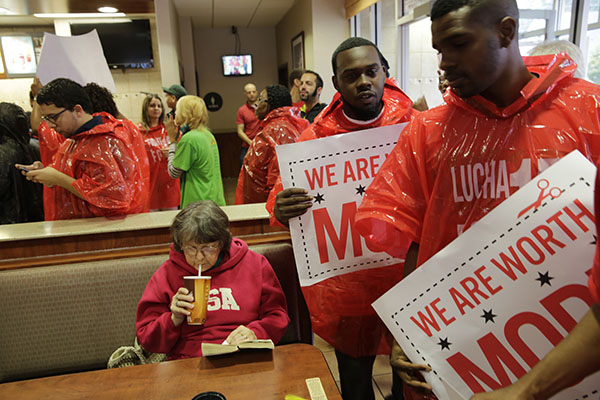
Photo: MICHAEL TERCHA / CHICAGO TRIBUNE
Chicago fast food workers march through a McDonald's on Lawrence Avenue during a strike last month.
She spends most of her days in downtown Chicago, but it never feels like home. Krystal Maxie-Collins is a full-time sales associate in the Women's Shoe Department at the State Street Macy's, but shopping and eating in the Loop is beyond her reach.
"I look around, a lot of the times, I can't afford to shop at Macy's. I can't afford to eat downtown usually—unless it's off a dollar menu. I'm down here for 10 hours a day, and I can't afford to take a lunch. Having to be downtown every day and feeling like, I'm not part of downtown, or the downtown culture."
Maxie-Collins is planning on being one of hundreds of retail and fast-food workers in downtown Chicago who will be going out on strike today as part of the Fight for 15 movement. The national strike will take place in more than 50 cities and involve thousands of employees. Fight for 15 is a national campaign launched by labor unions, community organizations, workers' aid centers to raise wages for retail and fast food workers to $15 an hour. Maxie-Collins currently earns $8.50 an hour after three years of employment with Macy's.
Fight for 15 helped organize strikes in April and August. Maxie-Collins says those actions are effective: "Since the first strike in April, the wage has gone from $8.25 to 8.50. Policies have improved in our store. When we pressure little by little, it makes a difference."
According to the Census Bureau, as of 2007 there were nearly 200,000 retail and food service workers in Chicago, and that number has only gone up since the recession of 2008. Maxie-Collins, like the great proportion of retail and food service workers, has found it persistently difficult to make ends meet.
"If it wasn't for the public assistance I receive, food and medical coverage would not be something I could afford at all. People think when you're using that structure, you're out of work, or you're lazy, but that's not the case." Maxie-Collins, a graduate of Jones College Prep in the South Loop, lives in Englewood. She spends over $120 a month commuting to and from the Loop for work.
Maxie-Collins and the other workers intending to strike today are not represented by a union; unlike in unionized workplaces, retail and fast-food workers will not be taking a strike authorization vote and walking out as a body. Instead, they will be relying on their federal legal rights under the National Labor Relations Act ("NLRA") to strike and picket their employer.
Section 7 of the NLRA protects workers' rights to enage in "concerted activity" for their "mutual aid and protection." All private sectors employees enjoy these rights, as well as protection from retaliation for expressing those rights. In other words, a minority—even just a couple—of employees can walk out for the purpose of influencing their employer to improve working conditions and wages, with or without a union or a strike vote.
Fight for 15 represents a trend towards so-called "minority unionism," organizing workers of many different employers in a given industry to take direct action to improve their workplace condition. Minority unionism has been proffered as an alternative to majority unionism—organizing an entire workplace into a union and negotiating a binding contract—because of the difficulties unions face in organizing new workers in the face of weak labor laws and employer hostility to unions.
A number of Chicago organizations have pursued similar strategies to improve the lot of low-wage workers, including Arise Chicago Worker Center and the Restaurant Opportunities Center. Arise Chicago helps workers collect unpaid wages and benefits through direct action on their employers or by aiding workers in securing legal representation. This type of direct action, like strikes, are considered legally protected "concerted activity," that cannot be retaliated against by employers.
Continued action by workers like Maxie-Collins are likely to continue, given the huge number of retail and food service workers in Chicago, and the importance of maintaining a vital shopping and eating atmosphere in the Loop. Maxie-Collins hopes there's strength in their numbers:
"These are jobs that a lot of people might think: 'They're not a real serious jobs.' But just imagine if we weren't here. Imagine life without us doing those jobs. And we work very, very hard. I know me, I'm on my feet eight to ten hours a day … I just feel that if we're working this hard and we're making the company this much money, we should be able to have our basic necessities met."


